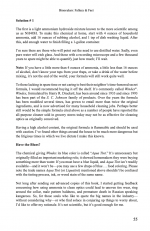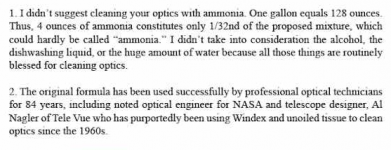Don’t do hide windows. Am very careful to avoid someone’s lunch detritus, my own sweat, drool, rain and snow. I used to clean the splodges from my eyeglasses with my necktie while at work. Getting new lens, wondering at how clear and clean everything looked it wasn’t till I looked at the mini scratches on my old eyeglass lens that I knew the new and improved vision wasn’t just the new prescription. In forty years my Bino lens have never seen a shirt tail. It’s not hard. Besides I hated messing up my neckties.So you pop your bins on the shelf while you open the hide window and find they have splodged in someone's unidentified lunch detritus. You then whip out your blower, your small bottles of chemicals and your cotton buds that you carry on you at all times? Or do you just wipe out the crud with your finger, breathe gently on the lens and wipe it with a random bit of clean cloth and maybe remember to give it a clean with the lens cloth it came with when you get back to the car and put the bins back in their case?
Last edited:











